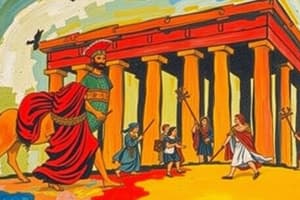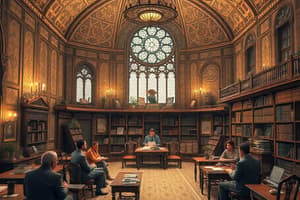Podcast
Questions and Answers
Which aspect of a teacher's background does NOT significantly shape their philosophical orientation?
Which aspect of a teacher's background does NOT significantly shape their philosophical orientation?
- Favorite color (correct)
- Economic background
- Educational attainment
- Social background
What constitutes a teacher's philosophy of education?
What constitutes a teacher's philosophy of education?
- The subjects a teacher is certified to teach
- A collection of favorite teaching methods
- A teacher's personal code of conduct
- The answers to questions regarding the purpose, content, and methods of teaching (correct)
How does philosophy of education influence teaching practices?
How does philosophy of education influence teaching practices?
- It determines the salary scale for educators.
- It shapes the beliefs and approaches educators use in teaching learners. (correct)
- It solely dictates classroom management techniques.
- It outlines the legal requirements for teacher certification.
Why is it essential for educators to understand various philosophies?
Why is it essential for educators to understand various philosophies?
Which of the following best describes 'philosophy of education'?
Which of the following best describes 'philosophy of education'?
What is the primary role of teachers in realism?
What is the primary role of teachers in realism?
What is the main focus of a content-centered educational philosophy?
What is the main focus of a content-centered educational philosophy?
How do teachers who adhere to idealism view learners?
How do teachers who adhere to idealism view learners?
What is the role of learners in the idealist perspective?
What is the role of learners in the idealist perspective?
What is a characteristic of the classroom atmosphere under idealism?
What is a characteristic of the classroom atmosphere under idealism?
In realism, how is truth determined?
In realism, how is truth determined?
What is the ultimate purpose of education in realism?
What is the ultimate purpose of education in realism?
Which subjects are most emphasized in the realist curriculum?
Which subjects are most emphasized in the realist curriculum?
What is the role of learners in realism?
What is the role of learners in realism?
Which of the following best describes pragmatism?
Which of the following best describes pragmatism?
What is the aim of pragmatic education?
What is the aim of pragmatic education?
What characterizes the pragmatic curriculum?
What characterizes the pragmatic curriculum?
How do pragmatic teachers view their role in the classroom?
How do pragmatic teachers view their role in the classroom?
What methods are commonly used by existentialist teachers?
What methods are commonly used by existentialist teachers?
What is the center of the existentialist curriculum?
What is the center of the existentialist curriculum?
What is the primary role of existentialist teachers?
What is the primary role of existentialist teachers?
According to perennialism, what should education primarily focus on?
According to perennialism, what should education primarily focus on?
Which of these is a characteristic of perennialist classrooms?
Which of these is a characteristic of perennialist classrooms?
What is the main goal of essentialist education?
What is the main goal of essentialist education?
Which teaching method do essentialist teachers prefer?
Which teaching method do essentialist teachers prefer?
Which kind of curriculum do progressivist teachers implement?
Which kind of curriculum do progressivist teachers implement?
How do social reconstructionist teachers operate in classrooms?
How do social reconstructionist teachers operate in classrooms?
What is a key feature of social reconstructionist curriculum?
What is a key feature of social reconstructionist curriculum?
What is an eclectic approach?
What is an eclectic approach?
Why do teachers implement an eclectic approach?
Why do teachers implement an eclectic approach?
Flashcards
Philosophy of Education
Philosophy of Education
A teacher's beliefs and philosophy that influence how learners are taught.
Idealism
Idealism
Idealism claims reality is mental, emphasizing ideas over physical matter.
Aim of Education (Idealism)
Aim of Education (Idealism)
Idealists' educational goal is to cultivate reasoning, moral character, and literacy.
Educational Methods (Idealism)
Educational Methods (Idealism)
Signup and view all the flashcards
Role of Teachers (Idealism)
Role of Teachers (Idealism)
Signup and view all the flashcards
Role of Learners (Idealism)
Role of Learners (Idealism)
Signup and view all the flashcards
Learning Assessment (Idealism)
Learning Assessment (Idealism)
Signup and view all the flashcards
Realism
Realism
Signup and view all the flashcards
Aim of Education (Realism)
Aim of Education (Realism)
Signup and view all the flashcards
Educational Methods (Realism)
Educational Methods (Realism)
Signup and view all the flashcards
Role of Teachers (Realism)
Role of Teachers (Realism)
Signup and view all the flashcards
Role of Learners (Realism)
Role of Learners (Realism)
Signup and view all the flashcards
Learning Assessment (Realism)
Learning Assessment (Realism)
Signup and view all the flashcards
Pragmatism
Pragmatism
Signup and view all the flashcards
Aim of Education (Pragmatism)
Aim of Education (Pragmatism)
Signup and view all the flashcards
Educational Methods (Pragmatism)
Educational Methods (Pragmatism)
Signup and view all the flashcards
Role of Teachers (Pragmatism)
Role of Teachers (Pragmatism)
Signup and view all the flashcards
Role of Learners (Pragmatism)
Role of Learners (Pragmatism)
Signup and view all the flashcards
Existentialism
Existentialism
Signup and view all the flashcards
Aim of Education (Existentialism)
Aim of Education (Existentialism)
Signup and view all the flashcards
Educational Methods (Existentialism)
Educational Methods (Existentialism)
Signup and view all the flashcards
Role of Teachers (Existentialism)
Role of Teachers (Existentialism)
Signup and view all the flashcards
Role of Learners (Existentialism)
Role of Learners (Existentialism)
Signup and view all the flashcards
Perennialism Aim
Perennialism Aim
Signup and view all the flashcards
Aim of Education (Essentialism)
Aim of Education (Essentialism)
Signup and view all the flashcards
Aim of Education (Social Reconstructionism)
Aim of Education (Social Reconstructionism)
Signup and view all the flashcards
Eclectic Approach
Eclectic Approach
Signup and view all the flashcards
Advantages of the Eclectic approach
Advantages of the Eclectic approach
Signup and view all the flashcards
Aim of Education (Social Reconstructionism)
Aim of Education (Social Reconstructionism)
Signup and view all the flashcards
Role of the teacher for reconstructionism
Role of the teacher for reconstructionism
Signup and view all the flashcards
Study Notes
- All professions are based on a philosophical underpinning, including teaching.
- A educators philosophy reflects their life experiences, beliefs, and background.
- Philosophy helps teachers answer questions like "Why do I teach?", "What is worth teaching?", and "How should I teach?".
- Every school and educator has a philosophy of education that influences how learners are taught.
Learning Objectives
- Explain the importance of philosophical orientation in teaching.
- Draw implications of different philosophies on teaching behavior and practices.
- Distinguish content-centered from learner-centered philosophies.
- Discuss advantages and disadvantages of philosophical orientations.
- Construct a "My Teaching Philosophy" statement
Philosophy Defined
- Philosophy means "perspective" or "view."
- Philosophies in education address questions like: "What is the aim of education?", "How should the school atmosphere look like?", and "What should be the content of the curriculum?"
- Each perspective offers different answers and has its own advantages/disadvantages.
Philosophy of Education Defined
- Philosophy of education is a teacher's perspective in their profession.
- A perspective is influenced by focus and attention.
Definitions of Philosophy of Education
- Philosophy of education applies philosophical ideas to educational issues. It helps educators form informed opinions on approaching these issues.
- Educators must be familiar with educational philosophies to adopt commitments that influence their educational system.
- Philosophy of education promotes a specific vision of education, examining its definition, goals, and meaning.
- It allows teachers to summarize the purpose of their activities, product quality, and production process.
- Teachers reflect on experiences and integrate beliefs/practices into life and society.
Importance of Philosophy of Education
- Philosophy of Education is essential in teacher training. It helps future teachers understand their roles and responsibilities, and determine the "how's" and "why's" of their profession.
- It guides teachers in planning by shaping their teaching methods based on their beliefs about how students learn.
- Philosophy helps teachers develop a personal perspective to see the interaction and synergy of education components like learners, curriculum, and aims.
Traditional Philosophies
- Four general philosophies useful in teaching: idealism, realism, pragmatism, and existentialism.
- Idealism and realism are content-centered while progressivism and existentialism are learner-centered.
- Content-centered philosophies emphasize social goals external to individuals, focusing on a subject-focused curriculum with an academic/theoretical orientation.
Learner-Centered Philosophy
- Learner-centered philosophy emphasizes the learners' nature and advocates continuous, lifelong learning.
- Its curriculum is open-ended, based on learners' interests and abilities. It values individual learners, promoting personal growth, freedom, and self-actualization.
The Traditional Philosophies Defined
- Traditional philosophies provide broad perspectives used to answer life questions.
- Educators apply these philosophies to understand, reflect on, and analyze educational issues.
Idealism
- Idealism asserts that reality is mental, not physical. Truth lies in the realm of ideas, which are reliable and eternal. Ideas are products of reasoning.
Aim of Education (Idealism)
- The primary goal is the absorption of ideas and character development. Schools should teach the wisdom of the ages and unchanging principles.
Educational Methods (Idealism)
- Idealists favor a holistic education with thematic subject matter arrangement. They prefer deductive logic and consider rote memory and lecture discussions effective.
Curriculum Features (Idealism)
- The idealist curriculum focuses on stimulating cognitive processes. It uses textbook knowledge to develop ideas, emphasizing formal subjects like literature, arts, philosophy, history, religion, and humanities. Field trips have limited use.
Role of Teachers (Idealism)
- Idealist teachers are "sages on the stage," dispensing knowledge and defining learners' learning. They transmit knowledge and act as authoritarian figures.
Role of Learners (Idealism)
- Learners are passive receivers under idealism. Good learners memorize classics and follow the teacher's questioning, reflection, and creativity.
Learning Assessment (Idealism)
- Idealism prefers subjective and qualitative evaluations such as essays. Learning assessment involves tests on processes and modes of thought.
Classroom Atmosphere (Idealism)
- The classroom climate is authoritarian with punitive discipline. Teachers craft rules and control instruction, while learners are not allowed to manage their schedule.
Disadvantages (Idealism)
- Idealism is criticized for emphasizing past traditions, making the curriculum difficult to change. It prioritizes mental development over physical development.
Realism
- Realism believes the real world exists independently of human experience. Truth is scientifically determined; knowledge is gained through senses and empirical reasoning.
Aim of Education (Realism)
- The ultimate purpose is understanding the world through inquiry and teaching essential, practical things. The world is fixed, and humans need to discover it.
Educational Methods (Realism)
- Realists favor inductive processes (concrete to abstract) and teaching for mastery of facts. Experimentation and drills facilitate mastering concepts and applying them correctly.
Curriculum Features (Realism)
- Science and mathematics are central. Vocational subjects are emphasized to provide practical knowledge and skills for work.
Role of Teachers (Realism)
- Teachers teach the regularities of nature objectively, detaching from personal biases to understand the natural law and order.
Role of Learners (Realism)
- Learners train their senses to analyze the physical world through scientific reasoning and skills.
Learning Assessment (Realism)
- Standardized testing and competency tests are preferred. Realism uses quantitative measures.
Classroom Atmosphere (Realism)
- Learner interests/emotions are secondary to subject matter. Classrooms contain pictures, maps, projects, and experiments, all teacher-centered.
Advantages (Realism)
- Realism offers scientific, technical, and vocational education, which provides useful skills. It prepares learners to compete in the work environment.
Disadvantages (Realism)
- It neglects ideals/values and emphasizes on objective teaching, which is a demerit because knowledge is also subjective.
Pragmatism
- Pragmatism means action/practice. It assumes ideas and actions must go hand in hand.
Philosophical Treatises(Pragmatism)
- Pragmatism rejects unchanging knowledge. It asserts there is no absolute truth: humans live in an evolving world. Task is to advance human life.
Aim of Education (Pragmatism)
- Learners learn through experiences, applying ideas to adapt and solve problems. Pragmatic education aims to reconstruct learners' experiences by manipulating the environment through hypotheses and answering questions to adapt.
Educational Methods (Pragmatism)
- Pragmatic teachers use methods suitable for developmental needs, favouring experience-based and individualized instruction. Strategies include experiments, projects, field trips, lab work, role playing, internships, group projects.
Curriculum Features (Pragmatism)
- The pragmatic curriculum is tailored to learners' experiences. It focuses on the learning process rather than content, advocating change in the curriculum.
Role of Teachers (Pragmatism)
- Pragmatic teachers are facilitators/guides, guiding learners and motivating them through mutual trust. They present realistic problems for learners to solve collaboratively.
Role of Learners (Pragmatism)
- Progressivist teachers look at the learners as individuals who are capable of experiencing, thinking, and exploring their lives and the world they are living in.
Learning Assessment (Pragmatism)
- Assessment focuses on problem-solving and practical application. Effective assessments align with learners' styles and are individual.
Classroom Atmosphere (Pragmatism)
- It is cooperative and democratic, encouraging divergent thinking.
Advantages (Pragmatism)
- Offers equal chances for individual to develop and grow.
Disadvantages (Pragmatism)
- Lacks fixed aims and overemphasizes personal experience, which is insufficient for learning as not all direct experiences are educational.
Existentialism
- Existentialism argues reality is subjective, based on individual perception. Humans control their reality.
Philosophical Treatises(Existentialism)
- Personally defined existence is key: learners define themselves, not passively receive knowledge. Learners discern what to keep or discard by critically evaluating.
Aim of Education (Existentialism)
- Reality is one's choices/views. Fitting individuals into a mold is unjust. They must make academic decisions on what, how they learn. Purpose is to provide a wide array of alternatives.
Educational Methods (Existentialism)
- Assist learners in self-realization through journals and modular instruction.
Curriculum Features (Existentialism)
- Emphasizes humanities, psychology, philosophy, and the arts to promote self-actualization.
Role of Teachers (Existentialism)
- Facilitate opportunities for self discovery.
Role of Learners (Existentialism)
- Empowered to discover and develop their potential.
Learning Assessment (Existentialism)
- Rejects standardized testing. Instead emphasises motivation and inner drive.
Classroom Atmosphere (Existentialism)
- Nurturing. Promotes free thought and creative individuality.
Advantages (Existentialism)
- Allows student individuality and autonomy.
Disadvantages (Existentialism)
- There is an extreme emphasis of personalization. It fails to put the value on technology.
The Educational Philosophies Defined
- Educational philosophies stem from traditional ones, incorporating elements like teacher/subject-centered approaches and beliefs in absolute realities
Perennialism
- Perennialism emphasizes everlasting ideas and rationality. Education aims to develop reasoning skills under a structured setup.
Philosophical of Treatises(Perennialism)
- The term is perennial, what is everlasting. It preserves the ideas of history.
Aim of Education (Perennialism)
- Development of human rationality through reason.
Educational Method (Perennialism)
- Regular testing, academic progress reports, structured teaching.
Curriculum Features (Perennialism)
- The Great Books represent knowledge/wisdom. Emphasis is on philosophy, literature, arts. Emotive studies are removed.
Role of Teachers (Perennialism)
- Teachers are primary source in the transmission of subject matter.
Role of Learners (Perennialism)
- Passive recipients of knowledge from classics.
Learning Assessment (Perennialism)
- Reading and computation through constant testing.
Classroom Atmosphere (Perennialism)
- Rigid classroom lead with teacher domination.
Advantages (Perennialism)
- Maxes learners' reasons and ultimatley transform into rational being.
Disadvantages (Perennialism)
- It has been criticized as intellectual giantism.
Essentialism
- Advocates societal.
Philosophical Treatises(Essentialism)
- Is rooted from realism in order to conserve tradition.
Aims of Education(Essentialism)
- Conserve social values: value and respect authority.
Educational Methods (Essentialism)
- Demonstration and memorization.
Curriculum Features (Essentialism)
- Taught writing and arithmetic.
Role of Teachers (Essentialism)
- Mediate the world between the adult world and youngsters.
Role of Learners (Essentialism)
- Have a passive role: follow directions and submit themselves to standards.
Advantages(Essentialism)
- Creates a stable society. Promotes the basics.
Disadvantages(Essentialism)
- The teachers are the focus.
Progressivism Defined
- Progress is essential.
Philosophical Treatises(Progressivism)
- Progressivism views change as unavoidable and emphasizes education that manages change, focusing on individuality.
Aim of Education (Progressivism)
- Aims to provide learners the ability to manage change and the development of students practically.
Educational Methods (Progressivism)
- It believes in providing learners inductive techniques and ideas must be tested and proven.
Curriculum Features (Progressivism)
- Features curriculums that are flexible and integrated with academic subjects that can fit the learner.
Role of Teacher (Progressivism)
- Progressive teachers guide the new upbringings and are the teachers of the change.
Role of Learners (Progressivism)
- Explore the world they are learning.
Learning Assessment (Progressivism)
- They must solve problems practically.
Classroom Atmosphere (Progressivism)
- Encourages fun experiences and exploration.
Advantages(Progressivism)
- All children are worthy to become individuals.
Disadvantages(Progressivism)
- Many schools lack the funding to perform these tasks.
Social Reconstructionism
Philosophical Treatise(Social Reconstruction)
- Is rooted from progressivism and existentialism.
Aims of Education(Social Reconstruction)
- Guides the leaerner to reach the social issues.
Educational Methods(Social Recontruction)
- Marries the theory to practice to allow teachers to be critical.
Curriculum Features(Social Recontruction)
- Is towards understanding and determining the dyanmics of the societies who have final decision.
Role of Teachers(Social Recontruction)
- Take the lead role in develping programs for social and economical change.
Role Learners(Social Recontruction)
- Seen as active participants.
Classroom Atmosphere (Social Recontruction)
- Is a labatory for discussing problems.
Advantages(Social Recontruction)
- Identify social problesm.
Disadvantages (Social Recontruction)
- Advocates social reform and does not achieve change.
Eclectic Approach
Eclectic Approach Defined
- Use multiple ideas in a comprehensive manner.
Emergence of Eclectic Approach to Educ Philosophy
- Emerged because teachers search for the best and come to ther conclusion, nothing is perfect.
Treaties of Eclectic AAproach
- A melting pot.
Application of Eclectic AApproach
- Works in a situational way depending on teachers and the curriculum.
Advantages of the Eclectic APproach
- It is a fusion. Can provide an intergral and comprehensive edcuaiton.
Disadvantages of the Eclectic App
- Lack of consistency and simplicity.
Performance Task 2
- The directions: Create your own teaching philosophy.
Studying That Suits You
Use AI to generate personalized quizzes and flashcards to suit your learning preferences.




